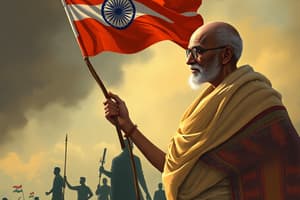Podcast
Questions and Answers
What is the essence of civil disobedience?
What is the essence of civil disobedience?
- Peacefully resisting unjust laws (correct)
- Ignoring all laws
- Supporting all laws without question
- Violently challenging existing norms
Who expressed refusal to pay taxes in his essay 'Civil Disobedience'?
Who expressed refusal to pay taxes in his essay 'Civil Disobedience'?
- One of Thoreau's followers
- Henry David Thoreau (correct)
- Mahatma Gandhi
- Socrates
What was one of the major events in which Martin Luther King Jr. demonstrated civil disobedience?
What was one of the major events in which Martin Luther King Jr. demonstrated civil disobedience?
- The Montgomery Bus Boycott (1955-1956) (correct)
- The Watergate Scandal
- The Boston Tea Party
- The Vietnam War protests
In what document did Martin Luther King Jr. articulate his doctrine of nonviolent civil disobedience?
In what document did Martin Luther King Jr. articulate his doctrine of nonviolent civil disobedience?
Which movement in the 1970s and 1980s utilized civil disobedience as a tactic?
Which movement in the 1970s and 1980s utilized civil disobedience as a tactic?
Which event led by Mahatma Gandhi is known as a nonviolent resistance campaign?
Which event led by Mahatma Gandhi is known as a nonviolent resistance campaign?
What did Socrates do during the Peloponnesian War that is considered an early example of civil disobedience?
What did Socrates do during the Peloponnesian War that is considered an early example of civil disobedience?
What criticism is commonly directed at civil disobedience?
What criticism is commonly directed at civil disobedience?
What was the main focus of Gandhi's civil disobedience campaigns in India?
What was the main focus of Gandhi's civil disobedience campaigns in India?
Which figure is credited with inspiring the development of civil disobedience as a powerful tool for social change?
Which figure is credited with inspiring the development of civil disobedience as a powerful tool for social change?
What is a key principle that proponents of civil disobedience emphasize for its effectiveness?
What is a key principle that proponents of civil disobedience emphasize for its effectiveness?
What role does civil disobedience play in challenging unjust laws?
What role does civil disobedience play in challenging unjust laws?
Flashcards are hidden until you start studying
Study Notes
Civil Disobedience: A Timeless Act of Conscience
Throughout history, civil disobedience has emerged as a significant method of contesting unjust laws and political systems. In its essence, civil disobedience is a peaceful form of resistance that challenges existing norms and authorities by deliberately breaking laws without resorting to violence. This article traces the origins and evolution of civil disobedience, demonstrating its profound impact on social change and democratic societies.
Early Origins
The concept of civil disobedience has its roots in ancient times, as illustrated by the acts of Thoreau and Socrates. Henry David Thoreau's essay "Civil Disobedience" (originally titled "Resistance to Civil Government") in 1849 expressed his refusal to pay taxes, arguing that he would not support a government involved in slavery. Socrates's decision to refuse military service during the Peloponnesian War in the 5th century BCE is another early example of civil disobedience.
Mahatma Gandhi: A Modern Pioneer
Mahatma Gandhi is arguably the most influential figure in the history of civil disobedience. During India's struggle for independence from British rule, Gandhi led nationwide campaigns of nonviolent resistance, such as the "Salt March" (1930) and "Quit India" (1942). Gandhi's campaigns were central to India's freedom movement and inspired the development of civil disobedience as a powerful tool for nonviolent social change.
Martin Luther King Jr.: A Righteous Crusade
Martin Luther King Jr. employed civil disobedience in his fight for racial equality in the United States. King's leadership of the Montgomery Bus Boycott (1955-1956), the March on Washington (1963), and other nonviolent campaigns profoundly influenced the civil rights movement's success. King's doctrine of nonviolent civil disobedience, as outlined in his "Letter from Birmingham Jail," remains an enduring legacy of nonviolent resistance.
Civil Disobedience in Contemporary Politics
Civil disobedience has continued to be a potent force in political discourse throughout the 20th and 21st centuries. The anti-nuclear movement in the 1970s and 1980s, the Occupy Wall Street movement in 2011, and the Black Lives Matter movement in 2014 are just a few examples of contemporary movements that have employed civil disobedience tactics.
Challenges and Criticisms
Civil disobedience is not without criticism and controversy. Some argue that civil disobedience can devolve into unproductive chaos or even violence, while others contend that it may not be an effective method for achieving long-term social change. However, proponents of civil disobedience maintain that practiced with discipline and nonviolence, civil disobedience remains an essential tool for democratic societies.
Conclusion
Civil disobedience has historically functioned as an essential mechanism for challenging unjust laws and spurring social change. Although civil disobedience has evolved over time, its fundamental principles and objectives remain consistent. As we continue to confront pressing social issues, civil disobedience will continue to serve as a powerful tool for those who seek to promote justice, equality, and human dignity. Thoreau, H. D. (1849). "Civil Disobedience" (essay) Gandhi, M. (1942). "Quit India" speech King, M. L. Jr. (1963). "Letter from Birmingham Jail" Occupy Wall Street, (2011-2012) Black Lives Matter, (founded 2013)
Studying That Suits You
Use AI to generate personalized quizzes and flashcards to suit your learning preferences.




